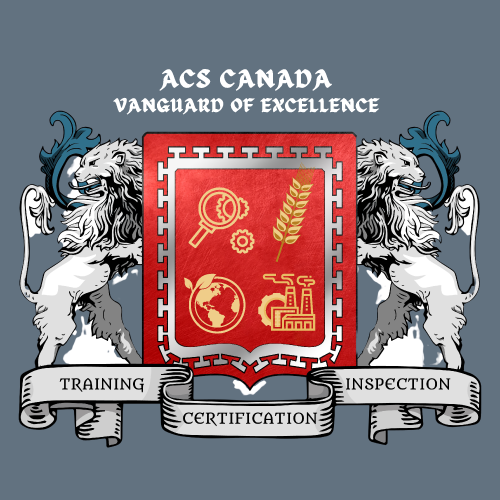GREEN RESTAURANT CERTIFICATION

SUSTAINABILITY AWARD
The Earth is currently facing a multitude of environmental challenges, including global warming, air pollution, ozone layer depletion, water pollution, climate change, and various other issues that impact every individual and living being on the planet. Consequently, people must actively adjust their daily actions to embrace eco-friendly practices and remain conscious of the environmental consequences of their choices.
Addressing climate change is a significant concern, particularly in developing countries. Promoting knowledge and understanding of the green concept within food service systems is a crucial pillar in fostering the growth and dissemination of environmental culture.
ACS Canada, known as one of the premier accredited certification bodies for the audit and certification of food safety and environmental management systems worldwide, has defined a set of environmental principles specifically tailored for restaurants, cafés, and food business operators. The Green Restaurant model serves as a comprehensive framework to assist food businesses in managing change and improving performance related to environmental aspects and impacts. This program has been designed to facilitate a shift towards more sustainable practices, fostering a green-oriented approach while simultaneously reducing costs.
ACS Canada's Green Restaurant Program encompasses eight fundamental principles that serve as guiding pillars for environmentally responsible practices within the food industry:
1. Water Efficiency: This principle emphasizes the importance of optimizing water usage and promoting efficient water management throughout restaurant operations, including measures to minimize water waste and enhance conservation practices.
2. Waste Management: Effective waste management practices are crucial for minimizing environmental harm. This principle focuses on strategies to reduce waste generation, implement recycling programs, and ensure responsible disposal of waste materials.
3. Reversibility to Nature: Recognizing the importance of ecological balance, this principle promotes the adoption of practices that are easily reversible to nature. It encourages restaurants to consider the environmental impact of their operations and choose practices that allow for the restoration and preservation of natural ecosystems.
4. Food Stability: Food stability refers to practices that ensure the safety, quality, and stability of food products. This principle emphasizes measures to minimize food waste, adopt sustainable sourcing practices, and promote responsible food production and distribution.
5. Consumption of Natural Resources: The responsible consumption of natural resources is a crucial aspect of sustainability. This principle highlights the importance of efficiently utilizing resources such as energy, raw materials, and ingredients, minimizing waste, and exploring sustainable alternatives.
6. Reduce Environmental Pollutants: This principle focuses on minimizing environmental pollutants resulting from restaurant operations. It emphasizes the adoption of clean technologies, pollution prevention measures, and continuous improvement in reducing the ecological footprint.
7. Training Record of Green Principles: Building a culture of environmental awareness and responsibility within the restaurant industry requires continuous training and education. Restaurants are encouraged to maintain comprehensive records of training programs that promote green principles among their staff, fostering a knowledgeable and environmentally conscious workforce.
8. Transparency: Transparency is a vital aspect of green restaurant practices. This principle highlights the need for restaurants to openly disclose their green policies, objectives, performance, and progress, allowing for external verification and evaluation.
Implementing and obtaining certification through the Green Restaurant Program offered by ACS Canada brings numerous benefits to food businesses:
1. Enhanced Reputation: Green Restaurant Certification from ACS Canada establishes restaurants as leaders in sustainable practices. It demonstrates a commitment to environmental responsibility, attracting environmentally conscious customers and enhancing the restaurant's reputation.
2. Cost Savings: Adopting sustainable practices often leads to cost savings in the long run. By optimizing resource usage, reducing waste, and improving energy efficiency, restaurants can minimize operational expenses and enhance profitability.
3. Customer Appeal: Green Restaurant Certification appeals to environmentally conscious customers who prioritize dining at establishments that align with their values. It can attract a wider customer base and increase customer loyalty and satisfaction.
4. Compliance and Risk Management: Certification ensures compliance with environmental regulations and standards, reducing the risk of non-compliance penalties and legal issues. Restaurants can operate with peace of mind, knowing they meet recognized environmental requirements.
5. Marketing Advantage: Being certified as a green restaurant by ACS Canada provides a unique marketing advantage. It differentiates restaurants from competitors, allowing them to stand out in a crowded market and appeal to environmentally conscious consumers.
6. Operational Efficiency: Embracing sustainable practices often leads to streamlined operations and improved efficiency. By reducing waste, optimizing energy usage, and implementing eco-friendly technologies, restaurants can enhance productivity and operational excellence.
7. Employee Engagement: Green practices foster a positive work environment and employee engagement. Staff members take pride in working for an environmentally responsible restaurant, leading to increased motivation, loyalty, and job satisfaction.
By partnering with ACS Canada in the Green Restaurant Program, food businesses gain access to a wealth of expertise and support. ACS Canada's certification and guidance empower restaurants to effectively implement environmentally responsible practices, enhance their competitiveness, and contribute to a more sustainable future.
Training at ACS Canada
ACS employs accelerated learning methods to ensure a comprehensive grasp of all certificates. Our approach involves contextualizing your learning through a wide array of options, including classroom instruction, workshops, as well as interactive and online sessions.
GREEN RESTAURANT CERTIFICATION Training - 1

ISO 14067 Carbon Footprint
Quantification of the carbon footprint of a product
More About This CourseGREEN RESTAURANT CERTIFICATION Training - 2

ISO 14007 Training Course
The aim of this course is to provide delegates with the knowledge and skills required to understand guidelines and steps of environmental costs and benefits-ISO 14007 and sustainability. ISO 14007 environmental costs and benefits concept: ISO 14007: “Environmental costs are any costs related to the environment, which can result from, for example, the loss of […]
More About This CourseGREEN RESTAURANT CERTIFICATION Training - 3

ISO 14006 Eco-Design
The aim of this course is to provide delegates with the knowledge and skills required to understand guidelines of Eco-Design-ISO 14006 and sustainability. ISO 14006 concept of Eco Design: ISO 14006: “Organizations are recognizing both the need to reduce adverse impacts on the environment from their product(s) and the need to include environmental considerations in […]
More About This CourseGREEN RESTAURANT CERTIFICATION Training - 4

ISO 50001 Requirements
The aim of this course is to provide delegates with the knowledge and skills required to understand requirements and documentation against the requirements of EnMS-ISO 50001
More About This CourseGREEN RESTAURANT CERTIFICATION Training - 5

Energy Saving Training Course
Through our training programs, we offer companies tools, resources, and training to help improve their organization’s energy understanding and performance. With our energy specialist mentor who are experienced as a registered energy advisor, we train companies and individuals to improve their sights of energy management and cut utility costs. Energy Mentor training empowers participants to […]
More About This CourseGREEN RESTAURANT CERTIFICATION Training - 6
ENVIRONMENTAL MANAGEMENT

ISO 14001 – Lead Auditor
This course aims to teach the principles and practices of ISO 14001 third-party audits. This course could be certified by Exemplar Global.
More About This CourseGREEN RESTAURANT CERTIFICATION Training - 7
INTERNAL AUDITOR COURSE

ISO 14001 – Internal Auditor
This course aims to teach the principles and practices of effective Environmental Management System first and second-party audits.
More About This CourseGREEN RESTAURANT CERTIFICATION Training - 8
REQUIREMENTS AND DOCUMENTATION

ISO 14001 Requirements
The aim of this course is to provide delegates with the knowledge and skills required to understand ISO 14001 requirements and documentation.
More About This Course
